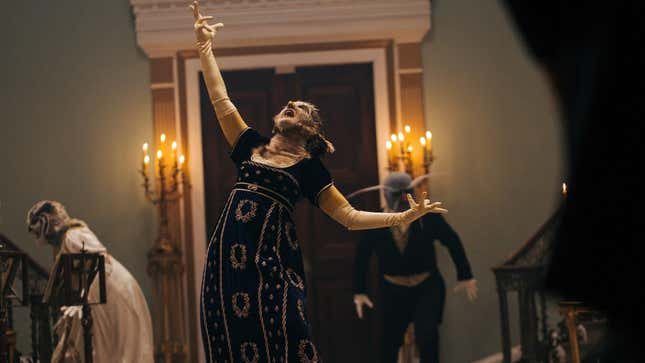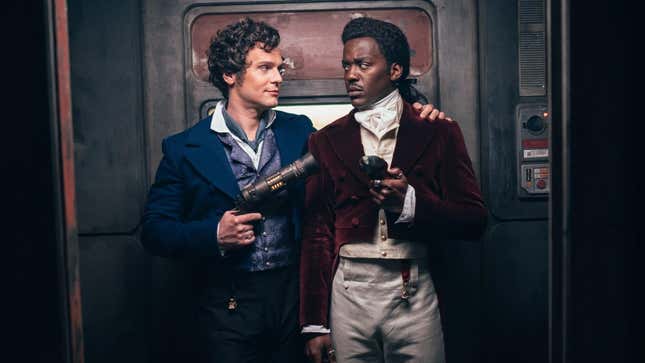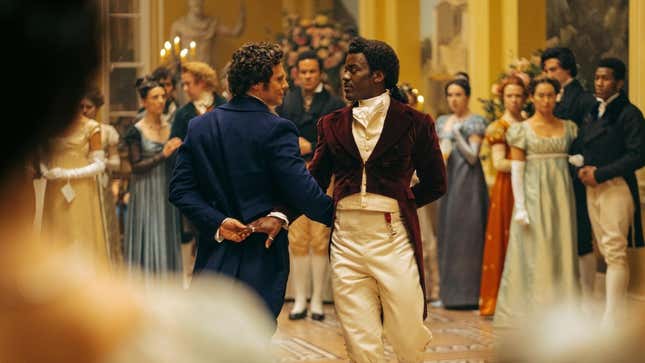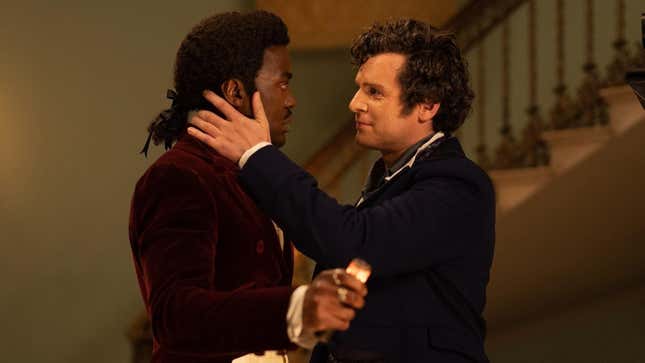ARTICLE AD
The Doctor’s romantic history has long been a fraught topic for the show to dive into—but in its modern incarnation, the Doctor’s identity as a sexual character, and how that interplays with their gender fluidity, has slowly but surely broken down barriers to allow interpretations of the Time Lord that broach all kinds of queerness, from asexuality, to gay and lesbian attractions, and everything in between. And so, Happy Pride, Doctor Who fans: now we can have camp, largely aimless silly adventures that also happen to be gay!
Doctor Who Cast Talk Upcoming Whovian Fashion

That is perhaps a bit mean to say of “Rogue”—an 1813 period piece that is a good 60% largely an excuse to run down lavish manor hallways and make the same “ooh, just like Bridgerton!” joke about seven times more than it should’ve been made, and 40% a bittersweet romance between the 15th Doctor and the Guest Homosexual of the Week, Jonathan Groff’s titular Rogue.
Rogue is a delightful turn from Groff: a mysterious, charmingly tragic bounty hunter who is in 19th century England on the hunt for a group of Chuldur, shapeshifting avian LARPers who are just as into Bridgerton as Ruby apparently is (they say “cosplay” a lot this episode, as the Chuldur obsess over which toffy aristocrat they’ll murder and take the place of next, but really, they’re LARPing. I promise this is the most annoying I’ll be about this specific thing). He’s also the thing that weaves this 60-40 camp split together, after he first pegs that a) the Doctor is similarly not of this time as he is, and a likely candidate for the Chuldur he’s hunting, and b) that actually, yes, the Doctor is very attractive and charming and clever, isn’t he? But here’s the thing: the 60% of this episode that is not about the Doctor and Rogue trying to charm each other’s period-appropriate pantaloons off of each other is just mostly fine.

Image: BBC/Disney
This is not a particular point of concern—we saw the perils last week of Doctor Who trying, and spectacularly failing, to marry an over-the-top premise with a very delicate and serious message. That “Rogue” is mostly brainless fun as the Doctor and Ruby, largely separate from each other, discover just why Rogue and then a bunch of bird aliens (one of which is played by Indira Varma, allowing her, via Torchwood, the chance of her third on-screen Doctor Who universe death when her innocent Duchess is the target of the lead Chuldur’s desire to cosplay) are hanging out in 1813 England is not entirely a bad thing. It’s Doctor Who in its charming, silly, but most harmless of styles: a lot of running around and screaming, a lot of camp, but not much more to say than that. And honestly, this season hasn’t really had that kind of rompy, alien creature feature caper yet—even “Space Babies” tried to have a little more going on beneath the surface—so it’s nice to get something in that style, even if the style is not one with much dramatic meat on its bones. Bird people shriek! Human people faint! Ruby gets a very silly little fight scene, thanks to some psychic earrings the Doctor let her borrow for dance lessons, set to a Bridgerton-style string rendition of Lady Gaga’s “Poker Face”! Did I mention this episode was glued together by perhaps a few too many Bridgerton jokes? Ah well, nevertheless.
Anyway, that’s not really the bit of “Rogue” that’s interesting: it’s the love story between the Doctor and Rogue that gives the episode something to chew on between the scenery-chewing. Groff and Gatwa are electric together from the moment they begin trying to suss each other out, and the episode effectively manages to string you along a “are they really going to go there?” moment as they go from potential rivals when Rogue thinks the Doctor is a disguised Chuldur, to a hero/anti-hero duo after each others’ hearts. It’s a windswept romance, but one that works; in the brief time the Doctor and Rogue get to know each other, there’s a connection that feels as electric and captivating as any time the Doctor first gets to know a future companion. They share a bond over the losses they’ve faced and the struggles they each feel in paradoxically craving connection while pushing others away, because their day jobs—being queer disasters in space—are so dangerous.

Image: BBC/Disney
But it’s also transgressive in fascinating ways—not because this is the first time we’ve seen this sort of textual queerness in Doctor Who, it’s nothing of the sort. The first on-screen queer kiss in the series happened almost 20 years ago at this point. And after the last era of the show failed spectacularly in its handling of the lingering feelings between the 13th Doctor and Yaz, it falls to “Rogue” to be the first time the Doctor explicitly gets to have a queer love story, and is allowed to go beyond expressing romantic interest or arousal and have that romance be a fundamental part of the narrative. It’s a bit “Girl in the Fireplace,” but for men who like men. In June, to boot!
If that wasn’t enough, “Rogue” even effectively manages to outdo last week’s “Dot and Bubble” in a roundabout way, too, because the transgressive nature of the Doctor’s romance with Rogue also becomes key to solving the entire story. If “Dot and Bubble” was meant to play with Ncuti Gatwa’s identity as the first Black man to play the Doctor—only to dump it all into a final scene that can’t say much more than “racism exists and is bad”—“Rogue” plays with the actor’s identity as the first openly queer man to play the Doctor, while making it an inherent aspect of the text. The denouement of the episode sees the Doctor and Rogue sweep into the middle of the ballroom dance that has been taking place in the background of all the shenanigans, realizing that the Chuldur, more than anything else, crave drama, selecting their shapeshifting targets out of who they can most be a queen through—they want to be the bad boy turning down dowries, the duchess, or, the two men in early-19th century England who are dancing the most romantic tango before their eyes.

Image: BBC/Disney
It’s a fantastic moment again, because Gatwa and Groff have an amazing rapport, but it’s also fantastic because it’s the Doctor using his queerness in that moment to expose his villains and save the day: it’s leveraging that this is transgressive for 1813 because it’s two men having a sensual dance and then turning down a public proposal to get the Chuldur out in the open! And for as much as Rogue and the Doctor are playing up the drama, there is still an element of truth beneath it that really sells it—in another life, perhaps the Doctor and Rogue do get together, travel the universe and fall in love. But even with that exaggeration for the Chuldur’s stake, this is a resolution to the story that cannot have been told unless you are categorically writing the Doctor as a queer person, and allowing what has been layered through years of interpretation and allusions to actually become part of the story.
Alas, queer or otherwise, that means we also have to run into the other pitfall of writing the Doctor into a romance: there’s always an inevitable tragic ending to this kind of story, inherent to the show’s premise—the Doctor has to be this quasi-lonely angel, constantly wandering and moving on from one place to the next, and romance represents a status quo shift that ties the character down to one person, if not one particular place. It’s not like romance with the Doctor on a long term basis can’t work; look at how the show handled River Song for so long during Steven Moffat’s tenure—but more often than not, the Doctor’s stories of love have to end in heartbreak. And so, Rogue has to sacrifice himself—choosing to save Ruby from the trap he and the Doctor have tricked the Chuldur family into—so the Doctor can feel sad, admire what had happened between them, and move on.

Image: BBC/Disney
Maybe we could see Rogue transform from a one-off fling into something more long term. The episode ends with the Doctor taking the ring Rogue faux-proposed with and adding it to the many this incarnation already wears on his fingers, and after all, Rogue’s sacrifice wasn’t a fatal one, he was just sent to another dimension with the Chuldur: one among many, as the Doctor says to Ruby. He could always be found if another story wants the character to be found. And even if he isn’t ever seen again? Perhaps it’s better for the Doctor to have loved and lost, than to have never loved at all: especially when Doctor Who uses the chance to make a queerness in the character that has long been at the edges of the series a fundamental aspect of their current identity and beyond.
Want more io9 news? Check out when to expect the latest Marvel, Star Wars, and Star Trek releases, what’s next for the DC Universe on film and TV, and everything you need to know about the future of Doctor Who.

 5 months ago
36
5 months ago
36 

